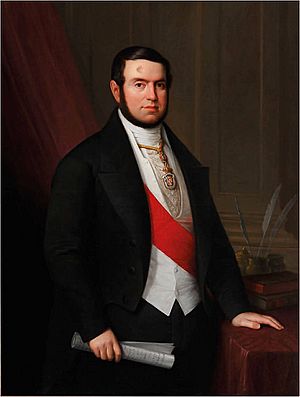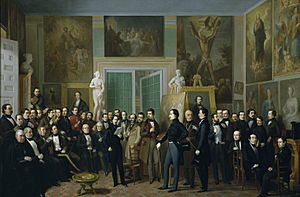Joaquín Francisco Pacheco facts for kids
Quick facts for kids
The Most Excellent
Joaquín Francisco Pacheco
|
|
|---|---|

Portrait by Antonio María Esquivel
|
|
| Prime Minister of Spain | |
| In office 28 March 1847 – 12 September 1847 |
|
| Monarch | Isabella II |
| Preceded by | Carlos Martínez de Irujo |
| Succeeded by | Florencio García Goyena |
| Seat b of the Real Academia Española | |
| In office 1847 – 8 October 1865 |
|
| Preceded by | Seat established |
| Succeeded by | José Selgas |
| Personal details | |
| Born |
Joaquín Francisco Pacheco y Gutiérrez-Calderón
22 February 1808 Écija, Spain |
| Died | 8 October 1865 (aged 57) Madrid, Spain |
| Political party | Moderate Party |
| Alma mater | University of Seville Asunción College |
Don Joaquín Francisco Pacheco y Gutiérrez-Calderón (born February 22, 1808 – died October 8, 1865) was an important Spanish politician and writer. People sometimes called him El Pontífice, which means "The Pontiff." He served as the Prime Minister of Spain in 1847. He also held other big jobs, like being the Minister of State (like a foreign minister) and the country's chief lawyer, the Attorney General of Spain.
Contents
Biography
Early life and education
Joaquín Francisco Pacheco was born in Écija, Spain, on February 22, 1808. His father worked for the city council. Joaquín studied subjects like history and literature at Asunción College in Córdoba.
In 1823, he went to the University of Seville. There, he studied law and became a lawyer in 1829. During his time at university, he became very good friends with another student, Juan Donoso Cortés. They both spent time in groups that talked about politics and writing.
Starting in journalism
In 1832, Pacheco moved to Madrid to work as a lawyer. He was also very interested in writing for newspapers and magazines. In 1834, he started his own newspaper called La Abeja (The Bee). He used this newspaper to share his ideas about a political movement called moderantismo, which was about having a balanced government. He also wrote for other newspapers like El Artista and El Español.

In the legal world, he worked with Juan Bravo Murillo to start a legal newspaper called El Boletín de Jurisprudencia y Legislación. Pacheco also taught law. He taught about constitutional law at the Ateneo de Madrid in 1844. Before that, he taught about general laws and criminal law.
Political career
Pacheco was a liberal politician and joined the Moderate Party in 1834. He believed that society and laws needed to change over time. In 1840, he told the parliament:
There are, gentlemen, needs that come with the times: nothing in the world
is permanent. Time is progressive, more so than men: human things are continually running, pulled forward by social progress, and cannot be restrained.
This means he thought that things in the world are always moving forward and changing, and people should accept that.
From 1837 to 1858, Pacheco was a member of the Congress of Deputies, which is like a parliament. He represented the Province of Córdoba. In 1858, he became a senator, another important political role.
On March 28, 1847, he became the Prime Minister of Spain. This was a very important job, but he only held it for five months. It was a difficult time because the parliament had many people who disagreed with him. Also, the king's husband, Francisco de Asis, and his friends did not like Pacheco.
Pacheco later returned to the Spanish Government as Minister of State. He served in this role with other leaders like Baldomero Espartero in 1854 and Alejandro Mon in 1864.
He also worked as an ambassador for Spain in other countries. He was the ambassador to Mexico from 1860 until he was asked to leave in January 1861. When he arrived in Mexico, he met with a leader named Miguel Miramón. This made the Mexican government unhappy because they saw Miramón as an enemy. So, when the government took back control of the capital city, they asked Pacheco to leave. The Mexican Secretary of State and Foreign Relations, Benito Juárez, sent him an order to leave on January 12. The message said that the president saw him as an "enemy of his government" because he had helped the "rebel usurpers."
Pacheco was also an ambassador to London (1856) and Rome (1854 and 1864). He was a prosecutor for the Supreme Court in 1843 and 1847. He was also a member of several important groups that focused on language, history, and arts, such as the Royal Spanish Academy and the Royal Academy of Fine Arts. In 1865, he was chosen to be the president of the Royal Academy of Jurisprudence and Legislation and the Royal Academy of Fine Arts, but he passed away before he could serve in the latter role.
Joaquín Francisco Pacheco died on October 8, 1865.
Works
Pacheco was also a talented writer. He wrote poems, a travel book, and plays.
Poems
- Catón (1828)
- A la señora doña... (1831)
- Oda a la amnistía (1833), a poem about forgiveness
- Una noche (1833)
- Meditación (1834)
Travel Book
- Italia (1857)
Theater
- Alfredo (1835), a romantic play
- Los Infantes de Lara (1836), a play based on history
- Bernardo del Carpio (1848), another play
History
- “Historia de las Cortes de 1837” (1839), published in Madrid Magazine
See also
 In Spanish: Joaquín Francisco Pacheco para niños
In Spanish: Joaquín Francisco Pacheco para niños
 | Sharif Bey |
 | Hale Woodruff |
 | Richmond Barthé |
 | Purvis Young |

